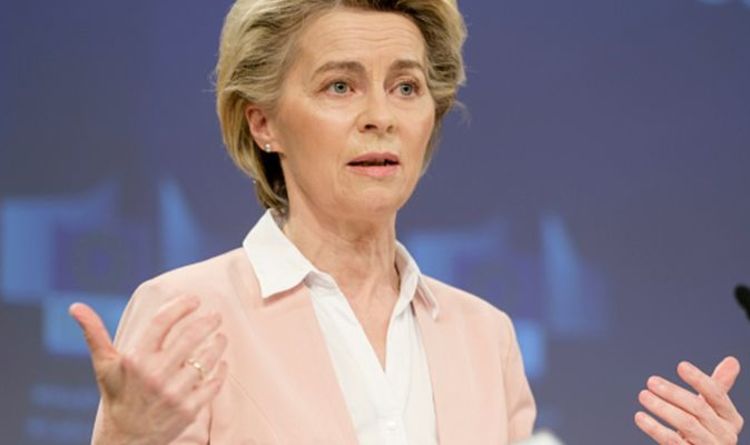European Union 'empire should be disbanded' says expert
We use your sign-up to provide content in ways you’ve consented to and to improve our understanding of you. This may include adverts from us and 3rd parties based on our understanding. You can unsubscribe at any time. More info
Laurent Berger, President of the European Trade Union Confederation, believes more integration in the EU is necessary to avoid a breakdown of the bloc into nation states focused merely on their own interests.
Speaking to France Inter radio over the weekend, Mr Berger said: “On the issue of tax optimisation, I think the EU should go much further.
“Because of my vision of Europe, I would like to see a stronger European integration.
“My responsibility in the European Trade Union Confederation shows me every day that if we don’t create more European integration, we will have a disintegration of Europe, because everyone will focus on their own issues, and this would include economic issues, social issues.
“We can see that it already concerns values.”
The warning comes as France, Finland, the Czech Republic and other central and eastern European countries have jointly pushed for including nuclear energy in the EU’s upcoming sustainable finance rules.

The European Commission is expected to make a decision in the coming months on whether the climate taxonomy will label nuclear energy and natural gas as green investments.
The first-of-its-kind regulation aims to steer private capital out of polluting economic activities and into those the EU deems environmentally friendly.
The countries have long pushed for nuclear to be included as a means of achieving the bloc’s climate goals, although the recent spike in energy costs, especially for gas, have added weight to the debate with the region heavily reliant on Russian imports.
“To win the climate battle, we need nuclear power,” said a statement from the countries, also signed by representatives of Poland, Hungary, Slovakia, Bulgaria, Croatia, Romania, and Slovenia.
READ MORE: Downing Street chaos as Greenpeace protest hits London
“It is, for us all, a crucial and reliable asset for a low-carbon future.”
The countries, led by France, said rising energy prices showed the importance of cutting dependence on third countries as soon as possible.
They said nuclear was an affordable and independent energy source which should be included in the taxonomy by the end of the year.
“All scientific assessments requested by the European Commission on the environmental impacts of nuclear energy come to the same conclusion: there is no science-based evidence that nuclear power is less climate-friendly than any of the energy sources included in the taxonomy,” the statement said.
DON’T MISS:
Brexit LIVE: EU deal on brink as DUP moves to cancel agreement [LIVE BLOG]
Widdecombe lays out reasons why asylum seekers prefer UK to France [INSIGHT]
Lord Frost & PM destroyed over NI Protocol ‘don’t you understand it’ [ANALYSIS]

EU countries are divided over nuclear, which produces roughly a quarter of EU electricity from the 13 states that use it.
Supporters promote its low CO2 emissions, while opponents, such as Germany, raise concerns over hazardous waste, and the delays and spiralling costs of recent projects.
France generates around 70 percent of its electricity from nuclear, while it accounted for around 37 percent of the Czech Republic’s electricity generation in 2020.
Meanwhile, two dozen countries have joined a US and EU-led effort to slash methane emissions 30 percent by 2030, giving the emerging global partnership momentum ahead of its launch at the UN climate summit in Glasgow later this month.
Nigeria, Japan and Pakistan are among the 24 new signatories to the Global Methane Pledge, first announced by the United States and EU in September with the aim of galvanising rapid climate action before the start of the Scotland summit on October 31.
It could have a significant impact on the energy, agriculture and waste sectors responsible for the bulk of methane emissions.
The nine original partners include Britain, Indonesia and Mexico, which signed on to the pledge when it was announced at the Major Economies Forum last month.
The partnership will now cover 60 percent of global GDP and 30 percent of global methane emissions.
John Kerry, US special climate change envoy, and Frans Timmermans, European Commission Executive Vice President, will introduce the new partners at a joint event on Monday and also announce that more than 20 philanthropic organisations, including some led by Michael Bloomberg and Bill Gates, will mobilise over $223 million to help support countries’ methane-reduction efforts, said the official, who declined to be named.
Additional reporting by Maria Ortega
Source: Read Full Article
